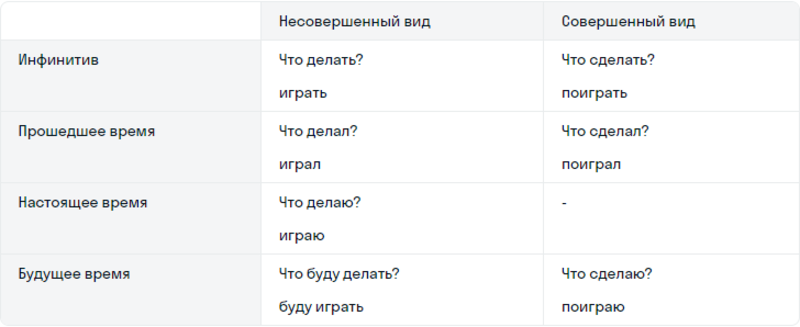Question
Aggiornato il
4 feb 2023
- Inglese (Regno Unito)
-
Russo
-
Tedesco
Domande Russo
Qual è la differenza tra imperfective verbs e perfective verbs ?Sentiti libero di rispondere con un esempio.
Qual è la differenza tra imperfective verbs e perfective verbs ?Sentiti libero di rispondere con un esempio.
Risposte
- Inglese (Stati Uniti) Quasi esperto
- Russo
Я смотрел это кино. I was watching this movie.
Я посмотрел это кино. I have watched this movie.
Questa risposta ti è stata d'aiuto?
- Inglese (Regno Unito)
@alien_in_andalusia so is imperfective more to do with a process whilst perfective is completing an action?
- Russo
@iamwellandgood
"Imperfective verbs" are used to describe a process or periodical actions, whereas "perfective verbs" - to describe a single action or result.
Utente esperto
Questa risposta ti è stata d'aiuto?
- Inglese (Regno Unito)
- Russo
@iamwellandgood
They're imperfective because they do NOT signify completed actions.
Utente esperto
Questa risposta ti è stata d'aiuto?
- Inglese (Stati Uniti) Quasi esperto
- Russo
Imperfective is more for a process and for repetitive actions while perfective has a result.
Other examples.
1. я сегодня пообедал (perfective) в кафе.
2. я обедал (Imperfective) в кафе каждый день.
3. когда я обедал (Imperfective) в кафе, начался (perfective) сильный дождь
Questa risposta ti è stata d'aiuto?
- Inglese (Regno Unito)
- Russo
@iamwellandgood I'll elaborate on it tomorrow if you need it:)
Utente esperto
Questa risposta ti è stata d'aiuto?
- Inglese (Regno Unito)
@alien_in_andalusia so if you were to say i usually sing in the shower, would that be imperfective as it is not repetitive so it would use the verb петь (я пою)?
- Inglese (Regno Unito)
Leggi ulteriori commenti
- Russo
In brief, the Perfect Aspect in English correlates with Russian perfective aspect.
Simple, Continuous and Present Perfect Continuous Aspects with some exceptions ( Past and Future Simple) are usually rendered into Russian as verbs in the imperfective aspect.
Utente esperto
Questa risposta ti è stata d'aiuto?
- Inglese (Stati Uniti) Quasi esperto
- Russo
- Inglese (Regno Unito)
@dest1ny- ah ok, yes looking forward to your explanation tomorrow! i’ll try to work on it a bit tonight too, thank you :) x
- Russo
@iamwellandgood sure, bud. Have a productive night, then:)
Utente esperto
Questa risposta ti è stata d'aiuto?
- Inglese (Regno Unito)
- Russo
@iamwellandgood
Imperfect verbs in an indefinite form answer the question: "что делать?". In either tense form, they denote a repeated or ongoing action, without indicating whether the action has been completed. Imperfective verbs have three tenses:
1) прошедшее время;
2) настоящее время;
3) будущее сложное время.
They mean:
a) action in extension, without indicating its limit;
b) the completion of action.
Examples:
1) Прошлой зимой мы чаще катались на коньках. Глагол - катались (прошедшее время, несовершенный вид).
2) Летом мы с братом будем купаться на озере. Глагол - будем купаться (будущее время, несовершенный вид).
Perfective verbs in an indefinite form answer the question: "что сделать?". Perfective verbs have two tenses:
1) прошедшее время;
2) будущее простое время.
In any tense form they call:
a) an action that is limited by some limit;
b) the result, the completion of an action or a separate stage.
Examples:
1) Маша отлично сдала экзамен, потому что упорно готовилась. Глаголы - сдала (прошедшее время, совершенный вид) и готовилась (прошедшее время, несовершенный вид).
2) Я обязательно решу все задачи правильно. Глагол - решу (будущее время, совершенный вид).
Here's an article in Russian for more details - https://skysmart.ru/articles/russian/sovershenn...
Utente esperto
Questa risposta ti è stata d'aiuto?
- Russo
@iamwellandgood I'm not sure if it really helps, but I tried my level best:)
Utente esperto
Questa risposta ti è stata d'aiuto?
- Russo
Well, I was NOT quite right: the topic is really rather complicated. Anyways, trust me, it's much more difficult when I think about it. Over time, you'll not even think of perfective/imperfective verbs.
To follow up: if a verb has a prefix, it's almost always perfective. Examples:
делать (imperfective) - ПЕРЕделать (perfective)
думать (imperfective) - ПРИдумать (perfective)

Utente esperto
Questa risposta ti è stata d'aiuto?
- Inglese (Regno Unito)
@dest1ny- thank you very much for your explanation, i think the difference between the two is slightly more clearer than before. and thank you very much for the article that was also very helpful :) !
- Russo
[Novità] Ehi tu! Dico a te che stai imparando una lingua!
Sai come migliorare le tue abilità linguistiche❓ Basta far correggere ciò che scrivi da un madrelingua!
Con HiNative, puoi ricevere correzioni su ciò che scrivi da utenti madrelingua gratis ✍️✨.
Con HiNative, puoi ricevere correzioni su ciò che scrivi da utenti madrelingua gratis ✍️✨.
Registrazione
Domande suggerite
- Qual è la differenza tra стал инженером e работал инженером e был инженером ?
- Qual è la differenza tra скорее e скорее всего ?
- Qual è la differenza tra расти e вырастать ?
- Qual è la differenza tra why would say наше метро e not наш метро ?
- Qual è la differenza tra оказаться e является ?
Newest Questions (HOT)
- Qual è la differenza tra stamattina ho detto a Lisa che ieri sera ero stato al parco e stamattin...
- Qual è la differenza tra il succo e la spremuta ?
Domande Recenti
- Qual è la differenza tra stamattina ho detto a Lisa che ieri sera ero stato al parco e stamattin...
- Qual è la differenza tra andiamo in macchina alla banca e andiamo in macchina in banca ?
- Qual è la differenza tra sobbalzare e sussultare e trasalire ?
- Qual è la differenza tra sosta e tappa ?
- Qual è la differenza tra vedere e guardare ?
Domanda precedente/successiva

Grazie! Puoi essere certo che il tuo feedback non verrà mostrato agli altri utenti.
 Grazie mille! Il tuo feedback è molto apprezzato.
Grazie mille! Il tuo feedback è molto apprezzato.










